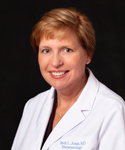ATLANTA—A new initiative, aimed at attracting nurse practitioners (NPs) and physician assistants (PAs) to rheumatology careers, kicked off in Atlanta Aug. 10–12. Dubbed The Training Rheum, the three-day boot camp is part of a budding alliance and collaboration between the ACR’s Committee on Rheumatology Training & Workforce Issues and the interprofessional division of the ACR, the Association of Rheumatology Professionals, and the American Academy of PAs.
“It’s well known that we expect a significant shortage in rheumatology professionals, and we are looking at ways to increase our workforce,” said Beth Jonas, MD, FACR, chair and faculty member of The Training Rheum and chair of ACR’s Committee on Rheumatology Training and Workforce Issues. She said PAs and NPs are attractive candidates for rheumatology careers, because in many cases, they already have thousands of hours of medical training and have proven to be dedicated and versatile.
To this end, Dr. Jonas said the goals for The Training Rheum are to help medical practices quickly onboard NPs and PAs already on staff, and to ensure they’re comfortable and knowledgeable with rheumatology as their career choice and that it’s the right fit for everyone.
Dr. Jonas is the Reeves Foundation Distinguished Professor of Medicine, chief, Division of Rheumatology, Allergy and Immunology, and director, Rheumatology Fellowship Program at the University of North Carolina School of Medicine, Chapel Hill.
A Dire Shortage
Dr. Jonas said that rheumatology is already facing a shortage of rheumatologists and the future looks even bleaker. According to the ACR workforce study, the demand for full-time rheumatology providers for adult patients—including physicians—was 12.9% below supply in 2015.1 By 2030, that number is projected to drop by an additional 25.2% from 2015 baseline levels—a shortage of 4,000 rheumatology providers. Meanwhile, largely driven by an aging population, demand is projected to exceed supply by 102%. The shortage will be most acute in rural areas.
One of the students attending the meeting said the lack of rheumatology professionals is the main reason she enrolled in The Training Rheum. “When patients are referred to rheumatology, it’s a long, long wait for them to receive care,” said Karin Schmottlach, PA-C, at Metro Health University of Michigan Health Care, Grand Rapids. “Plus, we can’t even take all the patients in need. If I could help lessen that burden and help get people in earlier, that would be a nice benefit for our office and fulfill my career aspirations.”



